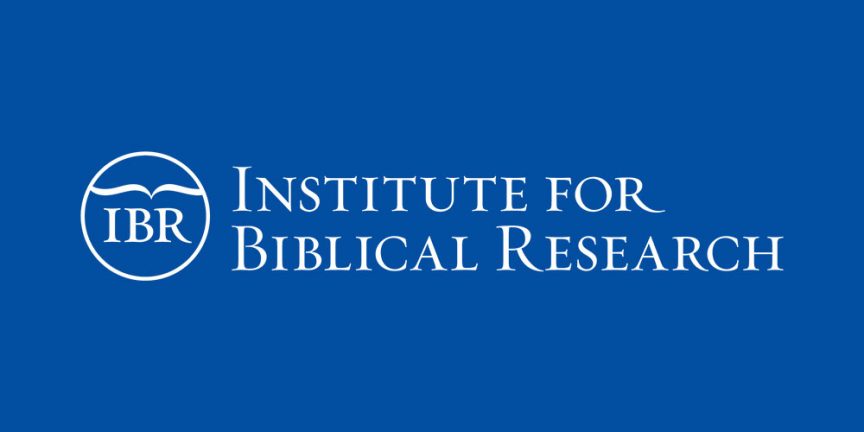Dear Colleagues,
I trust that your summer has gone well and that you were both enriched by your experiences and grew in your discipline. Several of our members have contacted me over the summer and their travels have taken them around the globe lecturing, researching, producing documentaries on the life of Jesus (a further report this weekend!), and a host of other activities. The list of member publications continues to grow impressively.
As you can see from our program this weekend, we have excellent presentations on issues highly relevant to the church and the academy. Again this year, we will have brief reports from our host publishers. Refreshments this year are provided by Baker Academic, and Jim Kinney will speak just prior to our refreshment time on Friday evening. On Saturday a.m. both Dan Reid (IVP) and Stan Gundry (Zondervan) will present briefly during the business session. We are delighted with the support of these publishers and the encouragement they give us to put out research in print—and not to forget the marvelous refreshments we have received from them for several years now.
You are encouraged to look on the web for the minutes of our Board of Directors meetings. Besides our meetings in person at the annual meeting (Friday and Saturday afternoon), we meet via teleconferencing twice through the year. Your officers are indicated in this newsletter and on the web; they are available to you for questions, concerns, and ideas on how we can expand our mission and influence evangelical scholarship. New initiatives are underway toward greater fulfilment of our mission; watch for these in this newsletter and online.
This year several more new colleagues will be joining the IBR and there is room for more! If you are aware of any evangelical scholars who would be good candidates for membership in the IBR, please do not hesitate to recommend them to us through Lynn Cohick, Secretary of the IBR. Our growth over past years is continual and we wish to remain an open community of evangelical scholarship. Do speak to your colleagues and invite them (bring them!) to our meetings.
On a personal note, I have retired from the presidency of Acadia Divinity College and enjoyed a sabbatical year at Princeton Theological Seminary over the last academic year, researching and teaching on canon formation. My wife and I have now moved to Mesa, Arizona where I am teaching some classes for Fuller Theological Seminary’s extension program in Phoenix and I am also the “scholar in residence” for the American Baptist Churches in Arizona, So. California, So. Nevada, and Hawaii. It is fun, keeps me busy, and reminds me regularly that what we do is a ministry for Christ and a very important ministry to our churches. May God enable all of us to keep that ministry perspective in mind as we use the gifts given to us to carry out our mission in theological education!
Blessings, and I look forward to speaking with you this weekend.
Dr. Lee McDonald, President
The Institute for Biblical Research: Fostering Evangelical Scholarship
IBR has, for over thirty years, offered to evangelical biblical scholars and Ph.D. students a venue for creative, reflective, and serious biblical scholarship. Its members are specialists in Old and New Testament and ancillary disciplines who seek to foster excellence in the pursuit of Biblical Studies in a faith environment.
The achievement of this goal is sought primarily by organizing annual conferences, conducting seminars and workshops, and by sponsoring academic publications in the various fields of biblical research. The Bulletin of Biblical Research was first published in 1991, and the BBR Supplement Series began in 2007.
Welcome to the annual conference; check out our web site for further information and history, and consider becoming a member with us!
BBR/BBR Sup Update by Rick Hess, Denver Seminary, BBR/BBR Sup Editor
The Bulletin for Biblical Research has announced plans to move to four issues per year in place of the current two issues. Both the quality and quantity of the work being published by the BBR justify this change and pave the way for an enhanced academic profile of the journal and its parent organization, the IBR.
The Bulletin for Biblical Research Supplement Series has published its second volume, War in the Bible and Terrorism in the Twenty-First Century, edited by Richard S. Hess and Elmer A. Martens. The book appeared in March and includes a collection of essays on this timely subject by a unique group of scholars: theologians (D. R. Heimbach, G. H. Stassen, M. Volf), biblical specialists (M. D. Carrol, R. Hess, E. Martens), and British and American military ethicists and personnel (I. G. C. Durie, T. Pfaff). The third volume, Critical Issues in Early Israelite Historiography, edited by Rick Hess, Gerald Klingbeil, and Paul J. Ray. Jr., is expected in the autumn.
Special thanks are due to our publisher Eisenbrauns for undertaking this additional work and continuing to produce elegant and accurate books and journals. The BBR Sup Series welcome submissions. Monograph titles and abstracts may be sent to the editor at [email protected].
Web News by Ted Hildebrandt, Gordon College, IBR Website Consultant
Numerous changes have been initiated on the www.ibr-bbr.org website this year. We changed our name to www.ibr-bbr.org thanks to the suggestion of Rick Hess. A huge effort was made last summer to scan and put the BBR up online and that project is still in process. The 2004 issues are up, and 2005.1 was available by late summer. We also placed Brent Sandy’s “Prophecy and Apocalyptic Bibliography Supplement” up online in an attempt to add substantial content to the site.
We are considering new ways to utilize this site. My son Zach continues to work on a search engine which will allow full text searching and browsing of the BBR online texts. Lissa Wray Beal suggested a blog built off the abstracts of the papers presented at IBR annual meetings. We continue to look for substantial biblical studies content that can be added to beef up our site. Lynn Cohick has shared her dream “that we get some interested colleges from the Majority world able to post ideas or papers on our site.” A network of contributors and vettors must be organized but the idea is worthy and doable. Others have suggested putting online dissertations of members that may not have been published etc. Many of these ideas are to be discussed at the board meetings. Your input is valued and if you have any ideas for our web site please feel free to submit them to me at [email protected].
Successful Sabbaticals: How-Tos from IBR Members by Lissa M. Wray Beal, Newsletter Editor
Sabbatical breaks can beckon like an oasis and IBR has many scholars who are anticipating and planning their first sabbatical; others look forward to their 2nd or 3rd period of concentrated research and writing. How does one best plan a 6 or 12 month sabbatical? What practices help one “be there” in that hiatus away from regular routines? How does one successfully reenter the rush of teaching once the sabbatical is over? A number of our IBR members took the time to share their insights; we hope their experiences help your next sabbatical.
Choosing a project is a crucial element of a successful sabbatical. Ed Neufeld recently completed his first sabbatical, and selected four smaller projects of personal interest that arose out of his teaching. Others focus on one larger project; Gus Konkel’s first sabbatical topic grew out of his dissertation while his second was a contracted commentary project. Selecting a project that is do-able within the time allotted appears to be a challenge for many in their first sabbatical; a chapter or article may be reasonable for a half sabbatical. Important limitations are continuing ministry or institutional commitments, spending time with family and friends, and practical considerations such as travel and adjustment time. R & R was approached very differently: some took a month off right away before the demands of the project took over; others worked full weeks and took periodic mini-breaks with family or on their own. Lynn Cohick began her sabbatical with a student trip with her college but then worked consistently through the remainder of the time at a slower pace that enabled more time for personal reflection and family-focused activities.
“At home or abroad” was an option for many with funding coming from scholarships as well as personal budgeting. For others, family and/or ministry considerations made relocation impossible; in such cases periodic visits to good libraries was sufficient. Rick Hess found relocation unnecessary; local libraries, interlibrary loans and internet resources were sufficient.
Collegial connections looked different for each individual. Some maintained weekly visits to their institution with lunch shared over enjoyable and stimulating conversations. Others found lasting friendships at centers such as Tyndale House. Most were unavailable to students for the duration, focusing instead on personal refreshment, research, and writing.
“Re-entry” tactics included meeting with one’s department head or dean, preparing oneself mentally for the transition to busy, high-energy semestral work, and valuable sabbatical-assessment during a personal retreat. All agreed that the lasting benefit of the sabbatical was the slower pace that allowed rest and reflection, the satisfaction of projects completed or enroute to publication, and the change of pace and/or place. One pearl of wisdom that those preparing for their first (or 5th!) sabbatical might remember was summed up by Lynn Cohick: “the busy schedule will be there when the sabbatical is over so. . . enjoy the space, and take time to do serious, slow thinking.” Rather than viewing the sabbatical as merely a means to publication, also consider the sabbatical as a time of formation and celebration in Christ!

